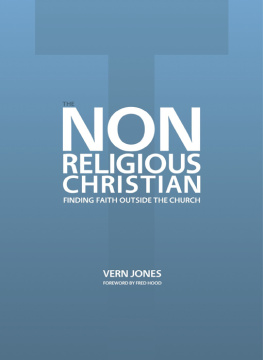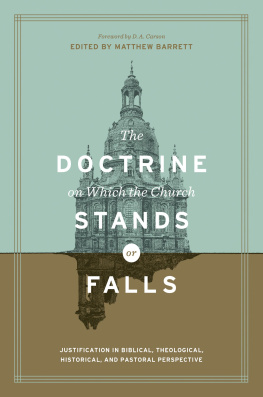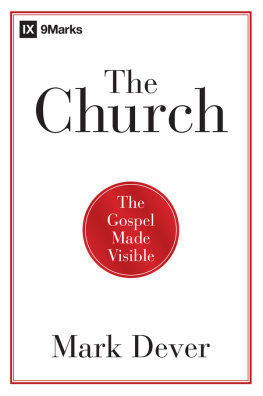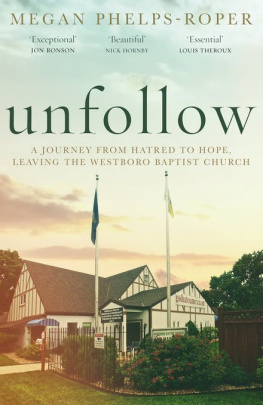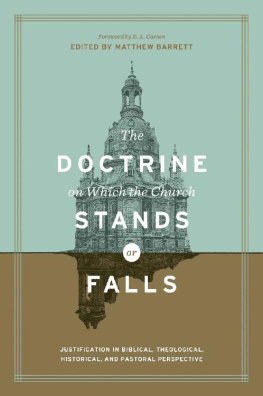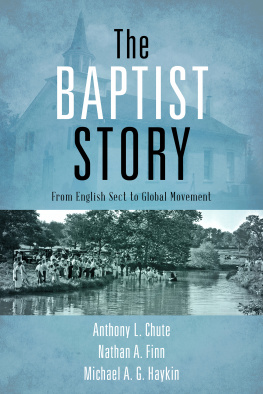Published by the University Press of Kansas (Lawrence, Kansas 66045), which was organized by the Kansas Board of Regents and is operated and funded by Emporia State University, Fort Hays State University, Kansas State University, Pittsburg State University, the University of Kansas, and Wichita State University
2016 by the University Press of Kansas
All rights reserved
Library of Congress Cataloging-in-Publication Data
Names: Barrett-Fox, Rebecca, author.
Title: God hates : Westboro Baptist Church, American nationalism, and the religious right / Rebecca Barrett-Fox.
Description: Lawrence : University Press of Kansas, 2016. | Includes bibliographical references and index.
Identifiers: LCCN 2016004956| ISBN 9780700622658 (cloth : alk. paper) | ISBN 9780700622665 (ebook)
Subjects: LCSH: Westboro Baptist Church (Topeka, Kan.)History. | Topeka (Kan.)Church history. | TolerationReligious aspectsChristianity. | Religious toleranceChristianity.
Classification: LCC BX6480.T67 B37 2016 | DDC 286/.5dc23
LC record available at http://lccn.loc.gov/2016004956.
British Library Cataloguing-in-Publication Data is available.
Printed in the United States of America
10987654321
The paper used in this publication is recycled and contains 30 percent postconsumer waste. It is acid free and meets the minimum requirements of the American National Standard for Permanence of Paper for Printed Library Materials Z39.48-1992.
To my friends at Peace Mennonite Church,
for being with me during the many Sunday mornings
when I couldnt be there with you.
ACKNOWLEDGMENTS
I am fortunate to owe debts to many colleagues and friends for their support of this project. Chief among them are Norman Yetman, American studies and sociology; Tim Miller, religious studies; Randal Jelks, American studies and African and African American studies; Ben Chappell, American studies; and Brian Donovan, sociology, who provided me with the confidence to see this project as a book. A developing scholar could not have had a more generous dissertation committee, making the University of Kansas a place where, indeed, seldom was heard a discouraging word, and I have continued to benefit from their insight and mentoring. In particular, Norm Yetmans careful and patient lessons in writing significantly improved the text found here, and his genuine enthusiasm for theology inspired me to prioritize that part of this study. Tim Millers feedback allowed me to place Westboro Baptist Church within a framework of religious tradition and innovation. Randal Jelks has been the biggest booster for the publication of this manuscript; I am grateful for his knack for calling or e-mailing me exactly when I need to hear a friendly voice. I thank Ben Chappell for the Rogerian therapy sessions; he can accomplish a lot with a few clarifying questions. Brian Donovan has encouraged me to take the scholarly risks that make this career a joy. I hope they are pleased with the results of their hard work.
Jason Barrett-Fox, my husband as well as my scholarly colleague; Karen Lombardi, who supported this project from our first visit to Westboro Baptist Church in 2004; the always encouraging Stephanie Krehbiel; my coworkers in the graduate writing program; my indispensable writing partner, Megan Williams; and Susan Kraus, who saw my need for time and place to write and provided it, were instrumental in keeping this project moving forward. Ailecia Ruscins talent as a photographer is equaled by her generosity as a friend and bravery as an activist and community leader. Friends at Peace Mennonite Church served as belaying partners, ready to pull me back if I ever felt the need to tug on the rope, and friends at New Creation Mennonite Fellowship rejuvenated me. Many, many others cheered me on throughout. The University of Kansas Graduate Schools Dissertation Fellowship and Summer Grant, the Norm and Anne Yetman Dissertation Fellowship, and the University Womens Fellowship provided not just financial support for this research but also an affirmation of its value. I am pleased to participate in this project with Kim Hogeland at the University Press of Kansas; everyone should get to work with such a talented editor. I appreciate the hard work of reviewers, including Cynthia Burack, whose feedback helped this manuscript find its final form.
Westboro Baptist Church produces enough public material that a scholarly content analysis of its digital culture would have been enough to fill a book. However, the generosity of church members and exchurch members allowed me to tell a different kind of story, one that, I hope, respects the lived experience of religion within the church and sees value in the members human relationships. I am grateful for their vulnerability and generosity of spirit and time, particularly from Shirley Phelps-Roper, Steve Drain, and Sam Phelps-Roper, who were patient with me as I grew in my understanding of Westboro Baptist Church theology, and those former members who kindly shared their stories with me. I never left an interview without feeling genuinely cared for, and I hope that church members see an equal care in the analysis I share here.
Each of my three children were infants at one point or another during this research project, and I was able to travel with them to field research because of the willingness of my extended family, both Barretts and Foxes, to care for them when asked. Jason Barrett-Fox has prioritized this work, ensuring that I had the time and intellectual space to do it. Thank you, Jason, for that, without which this manuscript could not have come to fruition.
INTRODUCTION
At the September 22, 2011, Republican presidential primary debate in Orlando, Florida, Stephen Hill, a soldier serving in Iraq, submitted a question for the Republican hopefuls via video. In it, he identified himself as gay and asked former Pennsylvania senator Rick Santorum if he would support the reinstatement of Dont Ask, Dont Tell (DADT), the defunct policy that had long prevented openly gay servicemen and -women from serving in the military. Not only did Santorum restate the right wings unsubstantiated position that allowing openly gay men and women to serve would undermine the effectiveness of the military, but neither he nor any of the other contenders thanked Hill for his service, a convention at such eventsnor did any of the debate participants rebuke the audience members who booed Hill. It trumps its arguments about government staying out of peoples personal lives, about the social value of marriages and stable families, and even about the dignity and respect due to soldiers and veterans.
In making their claim that Americas military readiness would be undermined by the presence of openly gay soldiers (or even closeted gay soldiers), the Republican contenders linked homosexuality and homeland insecurity. American soldiers, they said, would be fighting an external threat as well as an internal threat as previously closeted gay servicemen and -women fought against the American military from the inside, traitors not only to the natural plan that God intended for human sexuality but to their comrades and their nation. The Family Research Council (FRC), a conservative Christian political advocacy group, warned, The victims will be Americas parents, her sons and daughters, absent husbands and wives.


